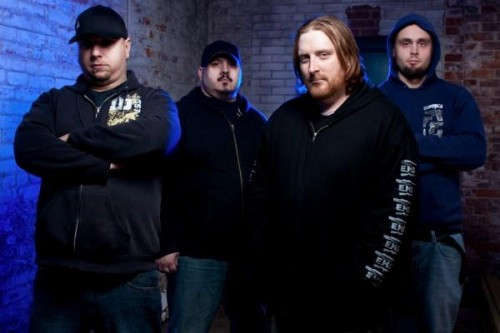The music comes first. The people who make the music come second. That’s just the way it is. But when the music strikes a chord, you want to know more about the people who make it, and how they make it, because sometimes, it opens a wider window into what you hear. And sometimes it doesn’t. Like we’ve said before, musical talent doesn’t necessarily go hand in hand with being able to express yourself in other ways.
We got an advance listen to Connecticut-based Pristina‘s forthcoming album on Trendkill Recordings, The Drought (Ov Salt and Sorrow), and were blown away. We posted our review of the album yesterday. In connection with our review, we asked vocalist/bassist “Evil” Brendan Duff if he would answer a few questions, and he foolishly agreed.
What started as a small handful of e-mailed questions to fill in a few blanks in our review turned into a mini-interview, and as more questions occurred to us, Brendan continued to answer (instead of telling us, “fuck off already!”), and it became something more full-fledged.
More than that, it was one of those genuinely window-opening conversations. We learned, among other things, about how this stunning album came to be, about some unusual aspects of how it was recorded, about how Today Is The Day‘s Steve Austin can come to resemble the demented shark-hunter in Jaws, about how the lyrics emerged from Brendan’s struggle to get clean from heroin, and about where this band is headed in their future music. In other words, we had a few of those days that make creating this blog truly worthwhile.
Our interview with Brendan Duff follows the jump, along with a few more tidbits of information about the band and the music.
How could you not get interested in a band named after a Faith No More song? At least long enough to listen a bit to the music? Well, we couldn’t. And that was all it took.
The music is brutally powerful, but also fascinating. There’s a maturity to the sound, which we suppose isn’t a huge shock. These dudes have honed their chops in other bands before — bands like Dry Kill Logic, 100 Demons, Invocation Of Nehek, A Thousand Falling Skies, and Born Under Saturn. And they’ve lived some life. You can see it in their faces. Two of the dudes are at the point of raising kids.
So we couldn’t resist trying to find out a little more, just to see what might be on the other side of that window.
BRENDAN DUFF INTERVIEW
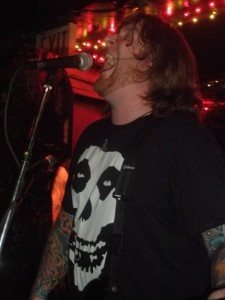 NCS: Many things about this album — from the crushing assault of the music, to the song titles, to the vocal samples, to the lyrics I can hear, to the decision to cover “Temple of the Morning Star” — suggest to me that in some way this is a “concept” album. Is it a concept album, as you see it? Is there a unifying theme or message that underlies the songs, or am I just imagining that?
NCS: Many things about this album — from the crushing assault of the music, to the song titles, to the vocal samples, to the lyrics I can hear, to the decision to cover “Temple of the Morning Star” — suggest to me that in some way this is a “concept” album. Is it a concept album, as you see it? Is there a unifying theme or message that underlies the songs, or am I just imagining that?
Brendan: As far as the record being a concept album, the answer is no and yes. The title track was intended to be released as a 23 minute single song EP. That song is a conceptual piece. Finding a label to release it took longer than we thought it would, so we decided to go into the studio and record some more songs. We thought the new recordings sounded really good and as an after-thought, we decided to add them to make a full length. So while the rest of the songs lyrically have nothing to do with “The Drought”, the mood of the record could be considered a “unifiying theme” for sure.
NCS: On the subject of the vocal samples, I know there’s a long passage in “The Drought” from John Moran’s Manson Family opera, and in “Because I Can Kill You v.2”, I recognize at least the words from the USMC Rifleman’s Creed popularized in Full Metal Jacket, though the sample isn’t from that movie. And it sounds like there may be a sample in “Moonshiner”, or maybe people in the band are speaking. Could you give us a rundown of the samples used in the album?
Brendan: The sample at the beginning of “Moonshiner” is Henry Rollins. I took it from one of his early spoken word albums. I was planning on doing a spoken part where I put the sample anyway, and when I remembered the Rollins quote, I realized that what he’s saying is along the lines of what I was trying to say anyway. So I just went with his. The one at the beginning of “Because I can kill you” is from the movie Jarhead. It’s this really tense scene and I thought it was perfect.
The Manson sample in “The Drought” is something that Steve Austin and myself put together. We wanted that section of the song to be all insane noise and feedback with a really intense spoken part over it. A total mindfuck. After stumbling across the Manson quote we threw it in, and purely by accident it worked perfectly.
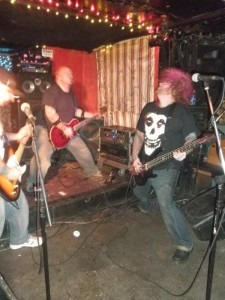 NCS: I’m really interested in how you approached the construction of that long title track. It seems to have some distinct pieces within it, and yet (as we said in our review), it all fits and joins together to create a distinctive mood. How did the writing of this song evolve and come to include each of the different sections of music?
NCS: I’m really interested in how you approached the construction of that long title track. It seems to have some distinct pieces within it, and yet (as we said in our review), it all fits and joins together to create a distinctive mood. How did the writing of this song evolve and come to include each of the different sections of music?
Brendan: I remember when I told the guys how I wanted to write a big ass, long jam. They looked at me like I was nuts. Maybe it comes easy for some bands, but definitely NOT us. As far as the approach, I had a basic idea of what I wanted the song to be and where I thought it should go. From there we basically took it one riff at a time.
A lot of the time I’d tell the other guys what I’m thinking and they would either try things until I heard what was in my mind, or come up with something better . . . or tell me the idea sucks and try again (HA!)
The song took over a year to write. No lie. Between shows, other material we were writing for an EP and lineup changes it felt like it took forever.
NCS: What did Steve Austin, Scott Angelacos, and Rennie Resmini each contribute to “The Drought (Ov Salt and Sorrow)”, the title track?
Brendan: Firstly, I couldn’t believe they all agreed to do it! At that time, I didn’t know any of them personally. I had met them each over the years at their shows, or shows our bands may have played together, but that’s it. As the song was taking shape, I decided I really wanted a guest vocalist. I found out how to reach Scott and went for broke. After he was on board, I thought there were two other slots where guest vocals would work.
Since by now Steve was signed on to do the record for us, I asked him if he would sing too, which he kindly agreed to. Lastly, I again went for broke and reached out to the singer of one of my all time favorite bands, STARKWEATHER.
Once they were all officially on the record, there was no way I was gonna have these guys who I grew up thinking so highly of, sing my lyrics. I had them all write their own lyrics for their sections.
The best part is, outside of the basic template of what the song is about, none of us had any idea what the others were gonna do vocally or lyrically. When Rennie and myself went to the studio to do his vocals, he hadn’t ever heard what mine sounded like. He had no idea what he was singing against, nothing. He didn’t care, he just went for it. I was in awe watching him do his thing. For real. Same went for everyone else.
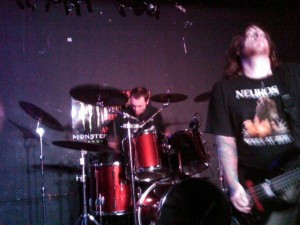 NCS: The lyrics to the songs are often angry but almost uniformly bleak, verging on hopeless. That kind of dark fury comes through in the music, too, at least as I hear it. If it’s not too personal a question, where did those feelings come from?
NCS: The lyrics to the songs are often angry but almost uniformly bleak, verging on hopeless. That kind of dark fury comes through in the music, too, at least as I hear it. If it’s not too personal a question, where did those feelings come from?
Brendan: I worked hard on the lyrics this time around. I usually bang em’ out as fast as possible to get the song ready to play live. It’s funny in a way, because I spent a lot of time over-analyzing what I wanted to say, and in the end, you can’t understand what I’m saying anyway. You know? All you can really make out is the singer going “RAAAUGGHHH RAUGGHH AHHHH”
The title track was the hardest for me. When you describe them as “bleak, verging on hopeless” you are 100% correct. At the time I was trying to get clean from a nasty heroin habit. It was the hardest thing I ever had to deal with. Getting sober was 10x worse than the addiction itself.
Lyrically, it represents where I was, and that’s why it was called “The Drought”. I felt dried up, physically and emotionally spent. I was trapped under the weight of this crushing depression and illness. No matter which way I turned, it just got worse. I really almost didn’t make it. All I could think about was just killing myself because I saw no other way out. Although I have come a long way, it is something I still deal with.
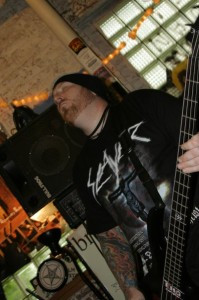 NCS: I understand Steve Austin did the recording, mixing, and mastering of the album. Could you single out just a few things that you think his production work contributed to the finished product?
NCS: I understand Steve Austin did the recording, mixing, and mastering of the album. Could you single out just a few things that you think his production work contributed to the finished product?
Brendan: Steve was a huge help in every way. For me personally, it was vocal production. I had never had any help previously doing my vocals and it was so much easier for me with him there. We took half a day before I stepped up to the mic, going over my lyrics parts and what I was trying to convey.
While we were actually recording the takes, I could tell that I was doing good when he would start pacing around the studio making pissed off faces, and the vein in his forehead would start throbbing. It was awesome! He sort of reminds me of the crazy captain in the movie JAWS.
NCS: Do you guys have any plans in the works to tour after the album is officially released? Selfishly, I hope the answer is yes, because I think it would be mind-blowing to hear the album performed live.
Brendan: We would like to tour more than we do, but that is the Achilles heal in this band. We have a really hard time getting tours and good shows for some reason. There is talk of heading to Europe in the winter, but as of now it’s just talk. I have been talking to some booking agents to get us out in the states more, but so far I haven’t found the right one. If you know anyone, send em’ our way. HA!
NCS: I know you guys have been working on songs for the next full-length album. How far along are you in that process, and how would you compare what you’re now doing with the music on The Drought?
Brendan: Yes, we are about halfway done with another album. “The Drought” has been finished for almost two years, and it took a long time to find a label willing to release it. So in the meantime we just kept writing. Creating “The Drought” really helped us advance as songwriters.
I think if people enjoy this one, the one we’re working on will blow people’s minds. We’re shooting for the next one to be about 13 songs. A highlight so far, is a trilogy of songs within the record that are practically an album on their own. The new material is the best music we’ve ever written. It’s bigger, heavier and more diverse. There are even “mellow” songs where I don’t just scream my face off.
About 10 months ago, we added one of my best friends and ex band mate J.P. (A Thousand Falling Skies) on rhythm guitar. The day he tried out he showed us a riff he had that fit perfectly into a song that we were stuck on, and we knew immediately that he was “the guy”.
I feel so lucky that after almost 7 years, Pristina still gets along and enjoy each other’s company. This is the only band I’ve ever been in where I actually look forward to band practice. These guys are my closest friends. It’s the only way we could have lasted so long, especially with all the obstacles we’ve had to overcome.
From day one, most people didn’t support us, wouldn’t book us on shows, wouldn’t give us a shot. I realize we’re not for everyone, so I have no illusions that this album will make us “big” or anything, That’s not what we’re about anyway. I just hope it makes people aware that we’re a good band playing some great music.
NCS: Well, you’ve sure convinced me of that. Many thanks for taking the time to answer our questions.
Brendan: Thank you so much for the interview and having us on your website man
********
Brendan mentioned in the interview the use of an extended vocal sample in that 23-minute title track from the album. It comes from John Moran‘s opera called The Manson Family. Using it was an inspired choice. You hear it once, and it catches in your head. The words are powerful, and they’re spoken powerfully in the sample. They take on a different connotation when you realize who is speaking them.
If you get interested enough in Pristina to track down the album when it emerges in September (and we hope you will), you’ll see what we mean. And maybe you’ll come back hear to read the words (which Pristina rearranged a bit in “The Drought”):
they’re sneaking in the county jail, looking under the door to see if the man is there.
sneaking like little children out of town.
sneaking all around the courthouse.
sneaking in and out of the ventilators, sneaking everywhere.
everything is sneaky up around sneakyville.
everything we have to do to get to the truth has to be sneaky.
it seems a shame to have to sneak to get to the truth.
to make the truth such a dirty old nasty thing.
you gotta sneak to get to the truth, the truth is condemned.
the truth is in the gas chamber. the truth has been in your stockyards.
your slaughterhouses.
the truth has been in your reservations, building your railroads, emtying your garbage.
the truth is in your ghettos.
in your jails.
in your young love.
not in your courts or congress where the old set judgement on the young.
what the hell do the old know about the young? they put a picture of old george on the dollar and tell you that he’s your father, worship him.
look at the madness that goes on, you can’t prove anything that happened yesterday.
now is the only thing that’s real.
you can try to prove that columbus sailed on an ocean, but it’s not the same ocean, it’s a different ocean, it’s a different world.
everyday, every reality is a new reality.
every new reality is a new horizon.
a brand new experience of living.
i got a note last night from a friend of mine.
he writes in this note that he’s afraid of what he might have to do in order to save his reality, as i save mine.
you can’t prove anything. there’s nothing to prove.
every man judges himself. he knows what he is.
you know what you are, as i know what i am.
we all know what we are.
nobody can stand in judgement, they can play like they’re standing in judgement.
they can play like they stand in judgement and take you off and control the masses, with your human body.
and they can lock you up in penitentiaries and cages and put you in crosses like they did in the past.
but it doesn’t amount to anything.
what they’re doing is, they’re only persecuting a reflection of themselves.
they’re persecuting what they can’t stand to look at in themselves.
the truth.
they can’t stand to look at the truth in themselves, they persecute themselves.
they’re butchering themselves every time they go on the freeway.
they hate themselves.
look at the signs.
stop.
go.
turn here.
turn there.
you can’t do this, you can’t do that, you can’t, you can’t, you can’t.
this is illegal, that’s illegal, everything is illegal.
the police used to watch over the people, now they’re watching the people.
the president doesn’t represent the people, he should be on the roadside picking up his children, but he isn’t.
he’s in the white house sending them off to war.
and you’re saying i have to pay for this again, and again and again.
i’ve got to pay for your sins.
how many times have i got to pay for your sins? i’m getting tired.
im getting tired.
the people you call my family where people that you didn’t want, children that were alongside the road that their parents had kicked out.
so i took them to my garbage dump, and fed them, and taught them that in love there is no wrong.
everything they’ve done, they’ve done for love of brother…

